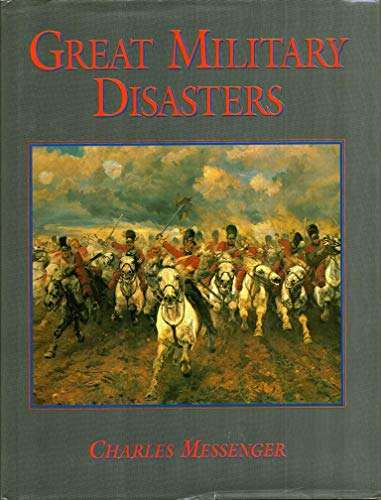
Great Military Disasters
Check my rate
| Main centres: | 1-3 business days |
| Regional areas: | 3-4 business days |
| Remote areas: | 3-5 business days |

| Main centres: | 1-3 business days |
| Regional areas: | 3-4 business days |
| Remote areas: | 3-5 business days |
published by Bison Group, London, 1991, hardcover, illustrated, index, 192 pages, large format, 23.7 cms x 31 cms, condition: as new.
Military Disasters are Human Disasters
By my reckoning, every military disaster is a human disaster, eleven of which are summarized in this very approachable and highly readable volume. The book was eye opening and should be of interest to anyone with an awareness of military operations as well as hubris, the overstated case for human rationality and sheer incompetence, all of which would be laughable if not so catastrophically disastrous for those involved in this, the most pernicious form of human folly.
The book is partitioned into two parts. In part one, the author elucidates the ingredients of military disaster, viz., The Commanders, The Planers and The Politicians. These constitute the three chapters of part one. Part two of the book then takes the reader through eleven, some major, some minor, all dreadful battles illustrative of the principles from part one. The book is thus subject to selection bias and confirmation bias in that it only includes those battles that confirm the hypothesis presented in part one as to the causes, or general principles, of military disaster. The author of course cannot include an account of all military disasters, the causes of which I think go well beyond those discussed in part one such as the very philosophical premises of the Nation-State itself. The causes listed in part one are those at the tactile or battle level (military incompetence). The deeper philosophical question is the cause of military confrontation in the first place (human incompetence). Any further discussion of this point is beyond scope of this book but still apposite to any discussion of human conflict. Still, the discussion of the causes provided by the author is very helpful.
The author, Charles Messenger, was a British Army officer and writer. He served for many years in the Royal Tank Regiment (19 years as a Regular, 13 years as a Territorial) before becoming a military historian and defense analyst after his retirement from active service. In addition to having published more than forty books during his long career, he also carried out several historical analyses for the Ministry Of Defence and was a writer and/or adviser for several TV documentary series.,